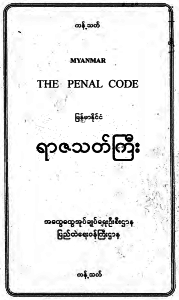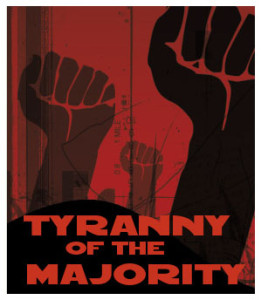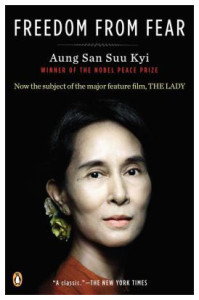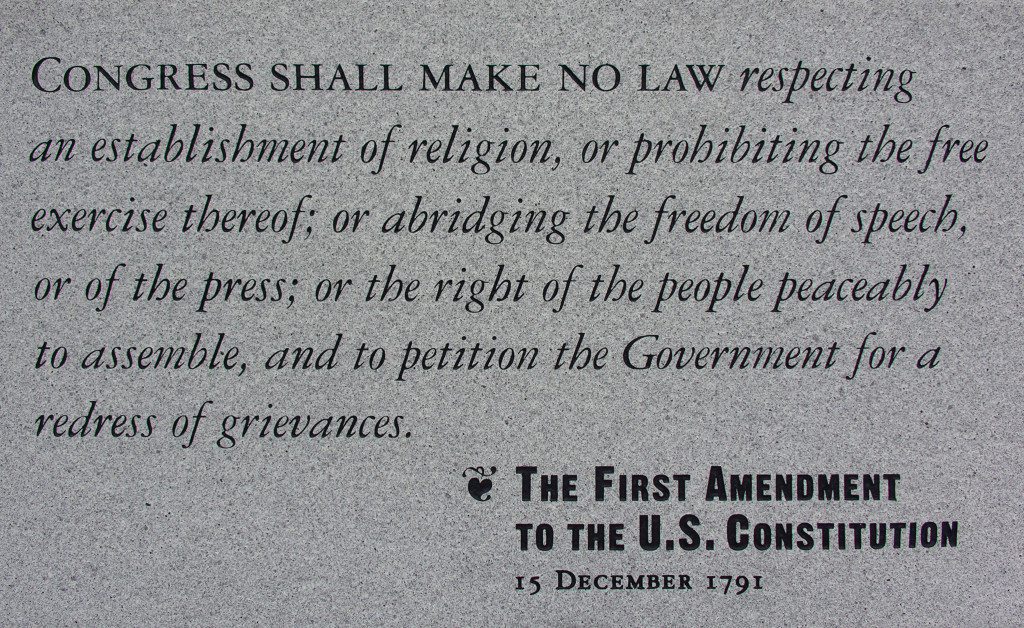 This week is another sad week for Myanmar as a country. Little known Penal code[note]”Of Offences Relating to Religion.” The Penal Code of Myanmar. Rangoon: Myanmar National Government Publication, 1974. 104-05. Print.[/note] Subsection 295(a) “Deliberate and malicious acts intended to outrage religious feelings of any class by insulting its religion or religious beliefs” and Section 298 “Uttering words, etc; with deliberate intent to wound religious feelings” has claimed 3 more victims. The laws themselves do not have malicious intent. In fact, the intent of the law is to protect religious freedom. However, it’s being abused by the monks of Organization to Protect Race and Religion (ma-ba-tha) to pressure the government and the (not so independent) judicial system to wield their bigoted agenda. This isn’t the first time the law has been misused to persecute citizens. The difference this time is that a foreigner was involved and the story is getting global media coverage. As bigotry has become a new symbol of our country, we should pause and reflect what has happened to our path to freedom and democracy. How is our country turning into the likes of Taliban Afghanistan or the Inquisition Europe?
This week is another sad week for Myanmar as a country. Little known Penal code[note]”Of Offences Relating to Religion.” The Penal Code of Myanmar. Rangoon: Myanmar National Government Publication, 1974. 104-05. Print.[/note] Subsection 295(a) “Deliberate and malicious acts intended to outrage religious feelings of any class by insulting its religion or religious beliefs” and Section 298 “Uttering words, etc; with deliberate intent to wound religious feelings” has claimed 3 more victims. The laws themselves do not have malicious intent. In fact, the intent of the law is to protect religious freedom. However, it’s being abused by the monks of Organization to Protect Race and Religion (ma-ba-tha) to pressure the government and the (not so independent) judicial system to wield their bigoted agenda. This isn’t the first time the law has been misused to persecute citizens. The difference this time is that a foreigner was involved and the story is getting global media coverage. As bigotry has become a new symbol of our country, we should pause and reflect what has happened to our path to freedom and democracy. How is our country turning into the likes of Taliban Afghanistan or the Inquisition Europe?
Moral Authority of Buddhist Monks
There is no doubt that Sangha, community of Buddhist monks, enjoy a special role in Burmese society. In a culture where respecting your elders and any form of superiority, the moral superiority of the monks reigns above all. The monastic robe demands instant respect and those who wear it enjoys the same. Even beyond the moral authority, due to the poor education and economic conditions, the Sangha also holds the position of educators and the educated, which is especially true for the poor and uneducated. There has also been a historical precedence of political monks who have peacefully fought against the tyranny of the British and the military dictatorship. Such exalted and revered position has been exploited by some in the monastic community, exemplified by Ashin Wirathu and organizations such as Organization to Protect Race and Religion (ma-ba-tha). Though they only have the support of the extremely nationalist part of the population who are mostly uneducated, those who oppose them have not voice their dissent as loud as them.
Tyranny of the Majority
 In a democracy, tyranny of the majority/masses occurs when “decisions made by a majority place its interests above those of an individual or minority group, constituting active oppression comparable to that of tyrants and despots. In many cases, a disliked ethnic, religious or racial group is deliberately penalized by the majority element acting through the democratic process.”[note]”Tyranny of the Majority.” Wikipedia. Wikimedia Foundation, n.d. Web. 19 Mar. 2015.[/note] Before we even have a good start to our democratic society, we have fallen into one of the evils that John Stewart Mill, a British philosopher, has warned about. (See below for writing of John Stewart Mill on Tyranny of the Majority) It is our civic duty as citizens of a democracy to guard against it. After all, in a democracy, we the people hold the power. We must speak out and guide our politicians to the path of political enlightenment. “At the root of human responsibility is the concept of perfection, the urge to achieve it, the intelligence to find a path towards it, and the will to follow that path if not to the end at least the distance needed to rise above individual limitations and environmental impediments.”[note]Aung San, Suu Kyi. “Freedom from Fear.” Freedom from Fear : And Other Writings. New York: Penguin USA, 1991. 180-185. Print.[/note]
In a democracy, tyranny of the majority/masses occurs when “decisions made by a majority place its interests above those of an individual or minority group, constituting active oppression comparable to that of tyrants and despots. In many cases, a disliked ethnic, religious or racial group is deliberately penalized by the majority element acting through the democratic process.”[note]”Tyranny of the Majority.” Wikipedia. Wikimedia Foundation, n.d. Web. 19 Mar. 2015.[/note] Before we even have a good start to our democratic society, we have fallen into one of the evils that John Stewart Mill, a British philosopher, has warned about. (See below for writing of John Stewart Mill on Tyranny of the Majority) It is our civic duty as citizens of a democracy to guard against it. After all, in a democracy, we the people hold the power. We must speak out and guide our politicians to the path of political enlightenment. “At the root of human responsibility is the concept of perfection, the urge to achieve it, the intelligence to find a path towards it, and the will to follow that path if not to the end at least the distance needed to rise above individual limitations and environmental impediments.”[note]Aung San, Suu Kyi. “Freedom from Fear.” Freedom from Fear : And Other Writings. New York: Penguin USA, 1991. 180-185. Print.[/note]
The Culture of Fear
There are consequences to not rising above the fear which is best described by Niemöller[note]Martin Niemöller (1892–1984) was a prominent Protestant pastor who emerged as an outspoken public foe of Adolf Hitler and spent the last seven years of Nazi rule in concentration camps.[/note] on how he ended up in a Nazi concentration camp.
“First they came for the Socialists, and I did not speak out—
Because I was not a Socialist.
Then they came for the Trade Unionists, and I did not speak out—
Because I was not a Trade Unionist.
Then they came for the Jews, and I did not speak out—
Because I was not a Jew.
Then they came for me—and there was no one left to speak for me.”[note]Martin Niemöller (1892–1984) was a prominent Protestant pastor who emerged as an outspoken public foe of Adolf Hitler and spent the last seven years of Nazi rule in concentration camps.[/note]
Our fragile democracy has been hijacked by religious extremist. And we are all sinners in the eyes of the religious authority. Think about it. Did you comply with the 8 precepts on the Buddhist holy days? Did you even remember the holy days? The music that you played too loud can send you to jail. Did you participated in a gossipy conversation where you were talking about violation of precepts by a religious person (doesn’t have to be a monk), like someone sleeping on a mattress? Their feelings might get hurt and you could end up in jail.
 Most of us fear questioning religious figures like monks because that a sign of disrespect, jailable offence by the way. And we fear being against the overwhelming agendas of the extremist. Daw Suu once wrote that “A most insidious form of fear is that which masquerades as common sense or even wisdom, condemning as foolish, reckless, insignificant or futile, the small, daily acts of courage which help to preserve man’s self-respect and inherent human dignity.”[note]Aung San, Suu Kyi. “Freedom from Fear.” Freedom from Fear : And Other Writings. New York: Penguin USA, 1991. 180-185. Print.[/note] Please rise up against these extremist that has taken our country to a path even Buddha would not approve of.
Most of us fear questioning religious figures like monks because that a sign of disrespect, jailable offence by the way. And we fear being against the overwhelming agendas of the extremist. Daw Suu once wrote that “A most insidious form of fear is that which masquerades as common sense or even wisdom, condemning as foolish, reckless, insignificant or futile, the small, daily acts of courage which help to preserve man’s self-respect and inherent human dignity.”[note]Aung San, Suu Kyi. “Freedom from Fear.” Freedom from Fear : And Other Writings. New York: Penguin USA, 1991. 180-185. Print.[/note] Please rise up against these extremist that has taken our country to a path even Buddha would not approve of.
Remember there is a difference between protection of the integrity of Buddha’s teachings and intolerance/exploitation of religious extremist. “The main task of the Buddhist monastic community is to preserve and practise the Teaching of the Buddha.”[note]”The Buddhist World: Monastics Role in Society.” The Buddhist World: Monastics Role in Society. BUDDHA DHARMA EDUCATION ASSOCIATION INC., n.d. Web. 19 Mar. 2015.[/note] They are not suppose to be playing politics, spewing hate speech or forcing you how to live your life.
What’s next
George Carlin, American social critic, once said “If (monks) want to play the game of politics, let them pay admission like everyone else.” The political monks should be subjected to the same rules that politicians have to abide by such as getting ridiculed for their beliefs, getting insulted and their positions taken away. There’s no reason to keep putting those who mock the monks’ beliefs in jail, like dictators. Therein lies the problem with the religious figures and their beliefs. It’s difficult to separate the two without proper laws and rules. That’s why there is a “separation of religion and state” in the First Amendment of the United States Constitution, which is the first fix Americans had to make to their constitution. Maybe it’s time for ours.
________________________________________________________________________________________________________
Follow Up Reading for Reference
John Stewart Mill on Tyranny of the Majority
“Like other tyrannies, the tyranny of the majority was at first, and is still vulgarly, held in dread, chiefly as operating through the acts of the public authorities. But reflecting persons perceived that when society is itself the tyrant — society collectively over the separate individuals who compose it — its means of tyrannizing are not restricted to the acts which it may do by the hands of its political functionaries. Society can and does execute its own mandates; and if it issues wrong mandates instead of right, or any mandates at all in things with which it ought not to meddle, it practices a social tyranny more formidable than many kinds of political oppression, since, though not usually upheld by such extreme penalties, it leaves fewer means of escape, penetrating much more deeply into the details of life, and enslaving the soul itself. Protection, therefore, against the tyranny of the magistrate is not enough; there needs protection also against the tyranny of the prevailing opinion and feeling, against the tendency of society to impose, by other means than civil penalties, its own ideas and practices as rules of conduct on those who dissent from them; to fetter the development and, if possible, prevent the formation of any individuality not in harmony with its ways, and compel all characters to fashion themselves upon the model of its own. There is a limit to the legitimate interference of collective opinion with individual independence; and to find that limit, and maintain it against encroachment, is as indispensable to a good condition of human affairs as protection against political despotism.”
The Penal Code of Myanmar – Chapter XV: Of Offences relating to Religion
295. Whoever destroys, damages or defiles any place of worship, or any object held sacred by any class or persons, with the intention of thereby insulting the religion of any class of person or with the knowledge that any class of persons is likely to consider such destruction, damage or defilement as an insult to their religion, shall be punished with imprisonment of either description for a term which may extend to two years, or with fine, or with both.
295A. Whoever, with deliberate and malicious intention of outraging the religious feelings of any class of [persons resident in the Union]1, by words, either spoken or written, or by visible representations* insults or attempts to insult the religion or the religious beliefs of that class, shall be punished with imprisonment of either description for a term which may extend to two years, or with fine, or with both. (Deliberate and malicious acts intended to outrage religious feeling of any class by insulting its religion or religious beliefs.)
296. Whoever voluntarily causes disturbance to any assembly lawfully engaged in the performance of religious worship or religious ceremonies shall be punished with imprisonment of either description for a term which may extend to one year, or with fine, or with both. (Disturbing religious assembly.)
297. Whoever, with the intention of wounding the feelings of any person or of insulting the religion of any person, or with the knowledge that the feelings of any person are likely to( be wounded, or that the religion of any person is likely to be insulted thereby, commits any trespass in any place of worship or on any place of sepulture, or any place set apart for the performance of funeral rites or as depository for the remains of the dead, or offers any indignity to any human corpse, or causes disturbance to any persons assembled for the performance of funeral ceremonies, shall be punished with imprisonment of either description for a term which may extend to one year, or with fine, or with both. (Trespassing on burial place, etc.)
298. Whoever, with the deliberate intention of wounding the religious feelings of any person, utters any word or makes any sound in the hearing of that person or makes any gesture in the sight of that person or places any object in the sight of that person, shall be punished with imprisonment of either description for a term which may be extend to one year, or with fine, or with both. (Uttering words, etc. with deliberate intent to wound religious feelings.)


